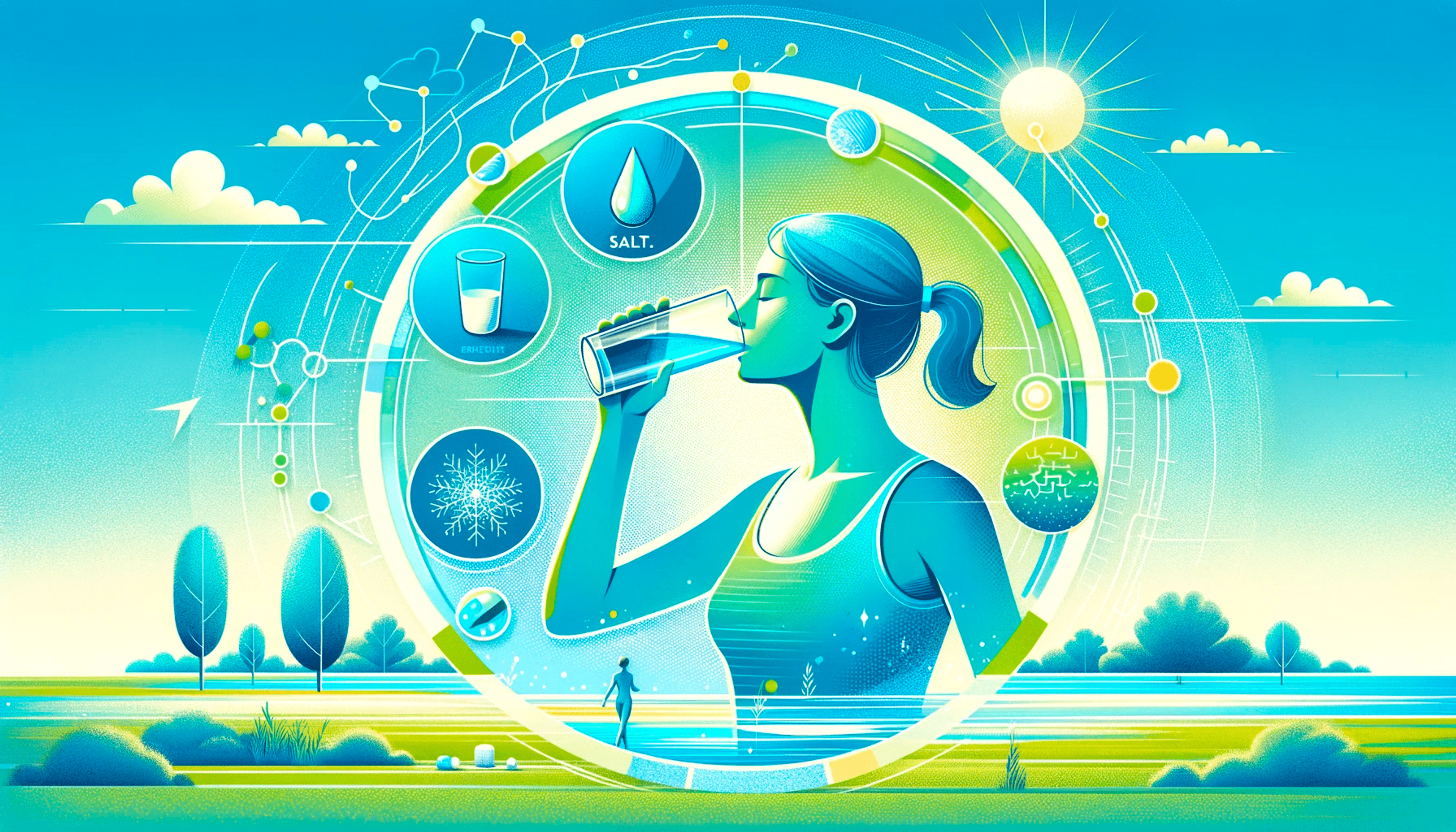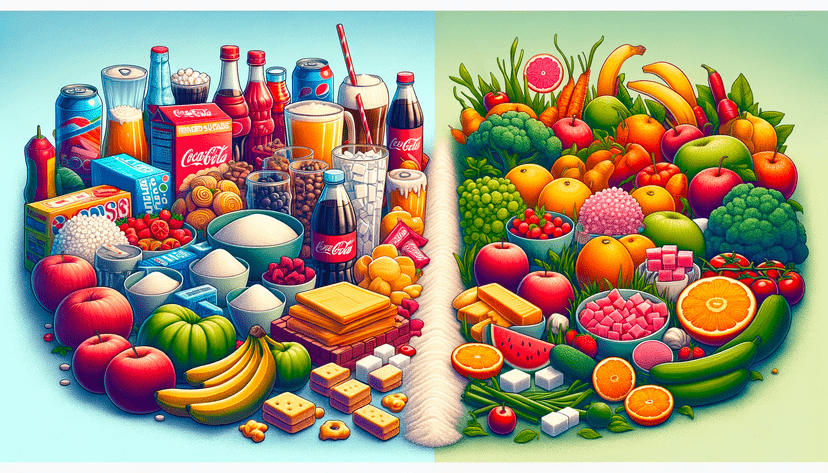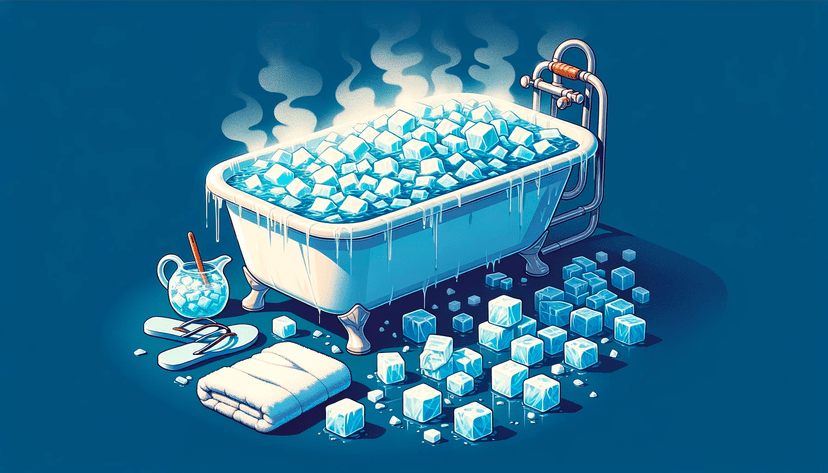The latest fad: Hydrate with salt and electrolytes, explained

Understanding Hydration and Electrolytes
An integral but often overlooked aspect of keeping our bodies functioning at their optimal level is proper hydration. Hydration is not just about drinking plenty of water; it also involves maintaining a proper balance of electrolytes.
Hydration is primarily the process of absorbing water and essential nutrients. When we consume water, our bodies also absorb electrolytes which help regulate myriads of bodily functions. From the beating of our hearts to the functioning of our brains, we significantly rely on electrolytes.
Basics of Body Hydration
At its core, hydration can be viewed as the mechanism by which our bodies regulate and distribute water. This regulatory process helps keep our bodily functions in check and vitals stable. When you drink water, you are not only quenching your thirst, but also ensuring that your body has enough fluid to carry out its essential activities. Blood circulation, energy generation, body temperature regulation, waste removal, and even joint lubrication- all these functions depend extensively on adequate hydration.
Think of your body as a machine and water as its oil. Without enough oil, the machine can't work smoothly and might even face severe damage over time. Hydration is similar to this, but for the human body, the water is vital to keep things running smoothly and effectively.
What are Electrolytes and Why are They Important?
Electrolytes are minerals found in our blood that help regulate and control the balance of fluids in the body. They are critical for many bodily functions. Some of the key functions of this natural compound include:
- Balancing the amount of water in our body
- Ensuring our nerves, muscles, heart, and brain work the way they should
- Balancing the pH level (acid-base balance) in the body
- Moving nutrients into our cells and waste out of our cells
Common electrolytes include sodium, potassium, calcium, and magnesium. A proper balance of electrolytes is essential for the normal functioning of cells and organs.
The Role of Salt in Hydration
One might wonder, why is salt being discussed in a conversation about hydration? The reason is sodium, a significant component of salt, is a key electrolyte. Sodium plays an essential part in hydration. As the main positive ion in fluid outside of cells (the so-called extracellular fluid which includes blood), sodium attracts water. More sodium means more water retention, hence the advice to reduce salt intake when dealing with conditions such as high blood pressure.
When we sweat, we lose both water and electrolytes, especially sodium and chloride, the two components that make up table salt. Drinking plain water can dilute the remaining electrolytes in our bodies, which is why after intensive exercise or an illness causing significant fluid loss, it's beneficial to consume drinks with both water and electrolytes.
In conclusion, proper hydration is not just about consuming a large amount of water but also about making sure our bodies retain a viable balance of electrolytes. Both water and electrolytes work hand in hand, ensuring our bodies function optimally.
We hope that understanding the basics of hydration, importance of electrolytes, and the role of salt will shed light on the importance of not just hydrating, but hydrating effectively. Consuming the right quantities, and understanding the scientific basis of hydration can go a long way in maintaining our health and well-being.
The Trend of Hydrating with Salt and Electrolytes
In recent years, there's been a noticeable shift within fitness and wellness circles towards hydrating with salt and electrolytes. More and more individuals, from gym-goers, athletes to hiking enthusiasts, have begun incorporating salt and electrolytes into their rehydrating strategies. The primary reason behind this practice is the perceived and researched benefits that these substances bring to the table, especially in terms of promoting optimal hydration and boosting performance.
Popularity in Fitness and Wellness Circles
As we engage in physical activities, our bodies lose water and salts. This is why drinking water is often not enough to recover from intense workouts – we need to replenish our electrolytes too. This understanding, along with the desire to optimize hydration, has made the use of salt and electrolyte supplements increasingly popular for individuals within fitness and wellness communities.
These products vary in forms: from drink mixes, tablets, to chewable supplements, making it possible for individuals to choose what best suits their lifestyle and preferences. With the continued endorsement from fitness influencers and testimonials from users, more people are encouraged to incorporate salt and electrolytes for hydration.
Comparing Electrolyte Drinks and Supplements
Electrolyte drinks, also known as sports drinks, typically contain key electrolytes such as Sodium, Potassium, Magnesium, and Calcium. These drinks are convenient to consume, providing hydration and energy from added sugars. However, they can also carry the downside of added calories from the sugars, potentially causing digestive upset in sensitive individuals.
On the other hand, electrolyte supplements often come in pill, tablet, or powdered form and are diverse in their composition. With supplements, you can expect a higher electrolyte concentration with reduced or no added sugars at all. This might be more beneficial to those who are calorie-conscious or prefer to control their sugar intake. However, the need to dissolve or ingest them might present a challenge to others.
Potential Benefits and Risks
The benefits of hydrating with salt and electrolytes are significant. As mentioned earlier, electrolytes - which include sodium, potassium, calcium, and magnesium - play essential roles in our bodies. They maintain fluid balance, promote muscle contraction, and help in nerve signal transmission, elements crucial in fitness and health.
However, it's also important to understand the potential risks. Excessive consumption can lead to electrolyte imbalance, leading to conditions like hypernatremia (excess sodium) or hyperkalemia (excess potassium), affecting heart function, among other potential health issues. Always consult your healthcare provider or a nutrition expert before incorporating any new supplement regimen. After all, the goal is to achieve optimum hydration and health, not counterproductively disrupting the body's balance.
Practical Tips and Considerations
In the world of health and fitness, the mantra "hydrate with salt and electrolytes" has been gaining traction. This hydration method has its roots in sound science, as both salt and electrolytes are crucial for maintaining proper fluid balance in the body. However, it's essential to approach this trend with knowledge and precaution. Let's dive into how to safely incorporate salt and electrolytes, explore natural sources of these key nutrients, and understand how to tailor hydration to individual needs.
How to Safely Incorporate Salt and Electrolytes
It's crucial to remember that not all salts are equal. When implementing this strategy, opt for sea salt or Himalayan pink salt, which are more nutrient-dense than table salt. Both these options contain essential minerals and provide more health benefits. Here's how to safely add them to your hydration routine:
- Start by adding just a small pinch (less than 1/8th tsp) of salt to your water and observe how your body reacts. If you feel fine, gradually increase the amount until you reach about 1/4th tsp per liter of water.
- Always drink this salted water along with food, never on an empty stomach.
As for electrolytes, consider a balanced electrolyte powder or supplement that has a mix of potassium, magnesium, calcium, and sodium. These should be added to your water as per the dosage recommended by the manufacturer or a healthcare professional.
Natural Sources of Electrolytes in the Diet
While supplements can help meet your electrolyte needs, they shouldn't replace a balanced diet. Many foods are a rich, natural source of electrolytes:
- Potassium can be found abundantly in bananas, sweet potatoes, and avocados.
- Magnesium shines in foods like spinach, almonds, and tofu.
- Calcium is championed by dairy products, leafy greens, and fortified plant milk.
- Sodium, which essentially constitutes salt, is naturally present in most foods, though more so in processed ones.
By incorporating a variety of these foods into your diet, you can help ensure a steady supply of these crucial electrolytes to your body.
Tailoring Hydration to Individual Needs
Everyone's hydration needs are unique and depend on various factors, including body weight, climate, height, age, and physical activity levels. As such, the notion of 'one size fits all' doesn't apply here. Here are some tips to guide you:
- Steer clear of relying solely on thirst as a hydration indicator. In many people, particularly older adults, thirst is not an accurate indicator of the body's hydration needs.
- If you're physically active or live in a hotter region, you might need higher salt and electrolytes intake than someone leading a sedentary lifestyle in a cooler climate.
- Remember, overhydration is just as hazardous as dehydration. Consuming excessive quantities of water, especially if salted, can lead to a state called hypernatremia, an elevated blood sodium level which can be dangerous.
Balancing the practice of hydrating with salt and electrolytes is a nuanced process. Informed adjustments, mindful observations, and regular consultations with a healthcare professional can help ensure you're getting it just right for your unique needs. With these tips, you're now armed with the necessary knowledge to approach this hydration trend responsibly and benefit optimally from it.
In Summary
This blog post has covered the crucial role that hydration and electrolytes play in maintaining our bodily functions. We have discovered that hydration is not just about drinking lots of water, but also about keeping a proper balance of electrolytes which regulate numerous body functions, including heartbeats and brain functioning.
The significant role of sodium, a major component of salt, in hydration has been highlighted. Sodium attracts water, thereby promoting water retention, and gets excreted in sweat along with water and other electrolytes.
We have explored the recent trend in fitness and wellness circles revolved around hydrating with salt and electrolytes with the help of electrolyte drinks and supplements. Despite the significant benefits these practices can bring, such as promoting fluid balance and muscle contraction, the potential risks of overconsumption leading to electrolyte imbalance have also been acknowledged.
Lastly, we have discussed the practical tips and considerations for safely incorporating salt and electrolytes into our hydration practice and diet. These strategies depend on individual needs based on body weight, height, age, physical activity levels, and climate conditions.
The action plan for implementing the knowledge from the article is tailored to personal hydration needs, but can generally be followed as such:
- Start by adding a small pinch of sea salt or Himalayan pink salt (for their richness in nutrients) to your water along with food. Gradually increase the amount based on your body's feedback upto 1/4 tsp per liter of water.
- Include a balanced electrolyte powder or supplement to your water, following the dosage guided by the manufacturer or your healthcare professional.
- Consume foods rich in potassium (bananas, sweet potatoes), magnesium (spinach, almonds), calcium (dairy products, leafy greens), and sodium (most foods, especially processed).
- Be aware of your hydration needs which depend on various factors like body weight, climate, physical activity levels, etc. Don't rely solely on thirst as your hydration indicator, and remember that overhydration is as problematic as dehydration.
In conclusion, remember to consult your healthcare provider before making significant changes to your diet and hydration practices. Stay hydrated, but do so mindfully and according to your individual body needs, considering the important balance between hydration and electrolytes. With this information and action plan, you are now equipped to approach the hydration trend responsibly and optimally.




